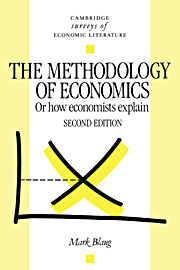Book contents
- Frontmatter
- Contents
- Preface
- Preface to first edition
- Part I What you always wanted to know about the philosophy of science but were afraid to ask
- Part II The history of economic methodology
- Part III A methodological appraisal of the neoclassical research program
- 6 The theory of consumer behavior
- 7 The theory of the firm
- 8 General equilibrium theory
- 9 Marginal productivity theory
- 10 Switching, reswitching, and all that
- 11 The Heckscher–Ohlin theory of international trade
- 12 Keynesians versus monetarists
- 13 Human capital theory
- 14 The new economics of the family
- 15 The rationality postulate
- Part IV What have we now learned about economics?
- Glossary
- Suggestions for further reading
- Bibliography
- Name index
- Subject index
13 - Human capital theory
Published online by Cambridge University Press: 10 December 2009
- Frontmatter
- Contents
- Preface
- Preface to first edition
- Part I What you always wanted to know about the philosophy of science but were afraid to ask
- Part II The history of economic methodology
- Part III A methodological appraisal of the neoclassical research program
- 6 The theory of consumer behavior
- 7 The theory of the firm
- 8 General equilibrium theory
- 9 Marginal productivity theory
- 10 Switching, reswitching, and all that
- 11 The Heckscher–Ohlin theory of international trade
- 12 Keynesians versus monetarists
- 13 Human capital theory
- 14 The new economics of the family
- 15 The rationality postulate
- Part IV What have we now learned about economics?
- Glossary
- Suggestions for further reading
- Bibliography
- Name index
- Subject index
Summary
Hard core versus protective belt
We turn next to a theory that requires the sort of full-scale treatment that it has rarely received. The birth of human capital theory was announced in 1960 by Theodore Schultz. The birth itself may be said to have taken place two years later when the Journal of Political Economy published its October 1962 supplement volume on “Investment in Human Beings.” This volume included, among several other path-breaking papers, the preliminary chapters of Gary Becker's 1964 monograph, Human Capital, which has ever since served as the locus classicus of the subject. Thus, the theory of human capital has been with us for more than twenty-five years, during which time the flood of literature in the field has never abated, at least not until the 1980s. The first textbook exclusively devoted to the subject appeared in 1963 (Schultz, 1963). After a lull in the mid-sixties, the textbook industry started in earnest: between 1970 and 1973 as many as eight authors tried their hand at the task, accompanied by the publication in rapid succession of seven anthologies of classic articles on human-capital-and-all-that; more recent years have seen three more textbooks (Psacharopoulos and Woodhall, 1985; Psacharopoulos, 1985; and Cohn and Geske, 1990). It may be time, therefore, to ask what all this adds up to.
- Type
- Chapter
- Information
- The Methodology of EconomicsOr, How Economists Explain, pp. 206 - 219Publisher: Cambridge University PressPrint publication year: 1992



